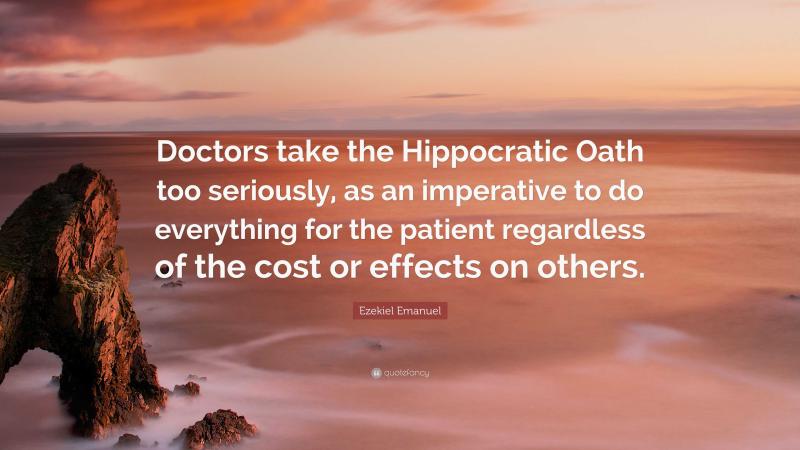Do all doctors have to follow the hyporcratical oath?
The Hippocratic Oath is a traditional oath historically taken by physicians, and it is often considered a symbol of medical ethics. However, the use and acceptance of the Hippocratic Oath can vary among different medical schools and regions. Additionally, modern medical ethics are governed by various professional codes and guidelines, and the Hippocratic Oath may not be universally required or followed in its traditional form.
Here are a few key points:
Variation in Oaths:
- Different medical schools and institutions may have their own variations of the Hippocratic Oath or other oaths that emphasize principles of medical ethics. Some medical schools have updated the language and content of the oath to better align with contemporary values and practices.
Secular Oaths:
- In many medical schools, oaths have become more secular, acknowledging a diversity of beliefs and ethical perspectives. The focus is often on principles such as patient autonomy, confidentiality, and the commitment to provide quality care.
Legal and Ethical Codes:
- Doctors are bound by legal and ethical codes that outline their professional responsibilities. For example, in the United States, medical professionals often adhere to the principles outlined in the American Medical Association's (AMA) Code of Medical Ethics.
Informed Consent and Patient Autonomy:
- While the Hippocratic Oath traditionally includes a commitment to respecting patient confidentiality and providing care for the sick, modern medical ethics place a strong emphasis on informed consent and patient autonomy. This means respecting the patient's right to make decisions about their own healthcare.
Global Variations:
- Medical ethics and the use of oaths can vary globally. Different countries and cultures may have their own traditions and ethical standards for medical professionals.
In summary, not all doctors are required to take the Hippocratic Oath, and its relevance and use can vary widely. The principles of medical ethics are embedded in various professional codes, guidelines, and legal standards that doctors are expected to follow. It's essential for healthcare professionals to be aware of and adhere to the ethical standards established by their respective medical boards or associations.
Do all doctors have to follow the Hippocratic Oath?
No, not all doctors have to follow the Hippocratic Oath. The Hippocratic Oath is an ancient oath that was first written in Greece around the 5th century BC. It is a code of ethics for physicians, and it outlines their duties to their patients and their colleagues.
The Hippocratic Oath is not a legal requirement, and not all medical schools require their students to take it. However, many medical schools do include the Hippocratic Oath in their graduation ceremony, and many doctors do choose to follow its principles.
How is adherence to the Hippocratic Oath monitored in the medical field?
Adherence to the Hippocratic Oath is monitored in the medical field in a number of ways. One way is through the medical licensing process. In order to obtain a medical license, physicians must pass a series of exams and demonstrate that they meet certain ethical standards.
Another way that adherence to the Hippocratic Oath is monitored is through professional organizations. Many professional organizations, such as the American Medical Association, have codes of ethics that are based on the Hippocratic Oath. Physicians who violate these codes of ethics may be subject to disciplinary action from their professional organization.
Finally, adherence to the Hippocratic Oath is also monitored by the public. Patients and other members of the public may report physicians who they believe are violating the oath to their medical licensing board or to their professional organization.
Are there consequences for medical professionals who deviate from the Hippocratic Oath?
Yes, there are consequences for medical professionals who deviate from the Hippocratic Oath. The consequences can vary depending on the severity of the violation. For example, a physician who violates the oath by committing fraud or by harming a patient may lose their medical license.
In addition to losing their medical license, physicians who violate the Hippocratic Oath may also face other consequences, such as:
- Being sued by their patients
- Being fined
- Being jailed
- Being publicly reprimanded or suspended by their professional organization
It is important to note that the consequences for violating the Hippocratic Oath are not always clear-cut. In some cases, it may be difficult to prove that a physician has violated the oath. Additionally, some violations of the oath may be considered more serious than others.
Overall, the Hippocratic Oath is an important set of ethical principles for physicians. Adherence to the oath is monitored in a number of ways, and there can be serious consequences for physicians who violate it.













